The Privilege of Denial
Why the smartest minds are often the best at avoiding their own reality
Over the recent years, I’ve noticed a curious pattern among people, particularly those who society often deems as successful or highly intellectual. It seems that with material success and recognition, there’s a tendency for certain blind spots to develop — how “socially-approved” success can sometimes create a buffer that makes it easier for all of us to avoid uncomfortable truths about ourselves.
I’ve seen it in family members, in friends, in colleagues, even in myself. There are times when we nest ourselves with people or systems that unintentionally reinforce these blind spots. Supposed love becomes something we tolerate because denial becomes the elephant in the room. I’ve seen denial take root, even among those who seem to have everything figured out.
But why do we choose denial, and why do we let others do the same? The answer lies in how we think about ourselves, how we’re conditioned by society, and how uncomfortable it can be to face our hidden sides. If we’re honest, we’ve all denied something — whether it’s an emotion, a bad habit, or a relationship problem. It’s easier to pretend it’s not there, at least for a while.
Denial manifests in all of us. And it isn’t your occasional defense mechanism, but a part of our daily lives that shape the way we interact with the world (Read: my piece on “How Our Feelings Shape Our World”). Admittedly, as a child, I learned to be fiercely independent when I started attending boarding school in the UK a few months after my 10th birthday. I realised I never turned to anyone for comfort or support because, honestly, I didn’t think I needed to. But the unprocessed hurt is there, and has surfaced in many unexpectedly ways.
I know I’m not alone in this. It’s something we all face, but rarely admit.
It’s Not Just Personal
Denial isn’t something you do on your own; it’s often a group effort. For example, in families where there’s trauma or dysfunction, everyone might silently agree not to talk about it. Or a toxic romantic relationship you can’t quite get yourself out of. You might see this at work too, where unethical behaviour is overlooked because “that’s just how things are done here”. On a larger scale, we see this in society when major issues like climate change or inequality are ignored (Read: my piece on “What Crisis?”). In situations like these, each person’s denial is supported and reinforced by the group dynamic.
I’ve felt this myself in social situations, where addressing the truth would disrupt the harmony of the group, and remaining dismissive and silent is just easier. But the silence (aka collective denial) only delays the inevitable. Sooner or later, reality catches up and the shock isn’t just from the truth being exposed; it’s from realising how many people played along.
The Shadow Side of Us
From a psychological perspective, Carl Jung’s concept of the “shadow” comes into play neatly here. Jung explored the parts of ourselves that we prefer to ignore — our darker impulses, repressed emotions and fears. And from what I’ve researched, these aspects don’t ever disappear just because we push them down. Quite the opposite. They tend to grow stronger as we age, eventually manifesting in destructive and uncontrollable ways (Read: my piece on “The Darker Side of Our Mind”).
Jung’s own struggle with his shadow was intense. It was both an internal battle, as well as a confrontation with the very fabric of the social and intellectual world he was part of. He went through a period of intense mental breakdown, where he had to face the uncomfortable truth that the beliefs he once held, including those shaped by his mentor, Sigmund Freud, no longer aligned with his evolving understanding of himself and the world (Read: “Rage and Anxiety in the Split between Freud and Jung”).
I want to highlight how courageous Jung’s break away from Freud was. He was stepping away from the dominant views of his time — letting go of something he once believed in, in order to carve out his own understanding. It was only by facing these parts of himself — and the societal expectations that came with them — that he could gain true freedom to heal and grow.
And the same is true for all of us.
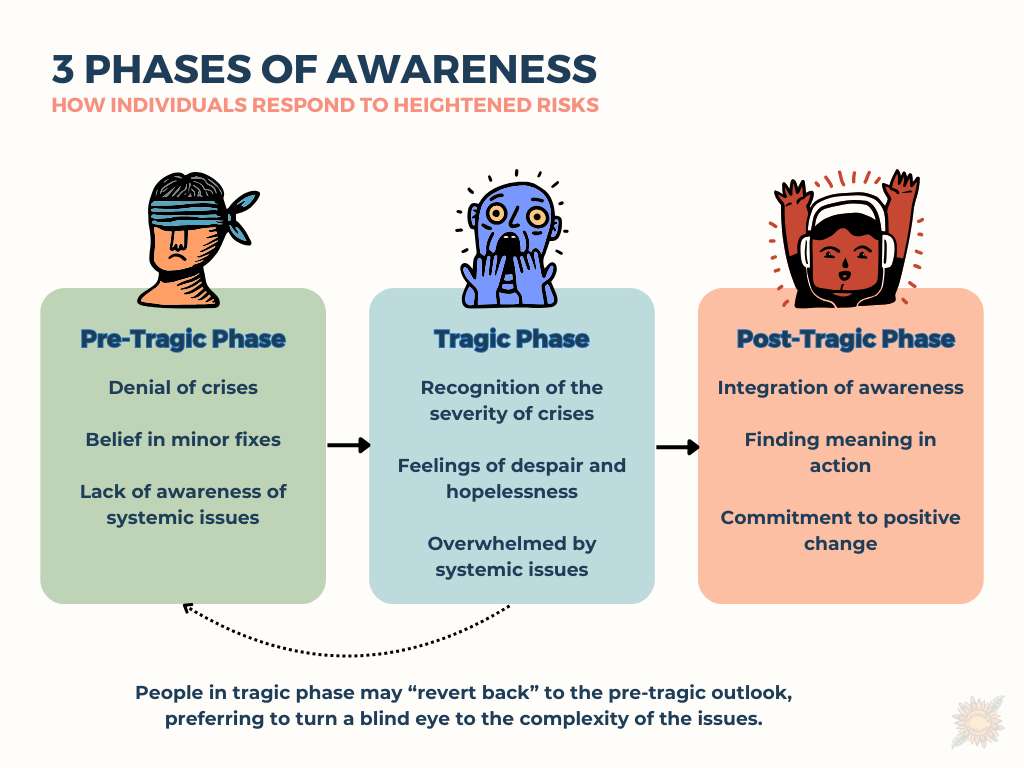
Buddhism and Denial: A Path to freedom
Buddhism has long taught us about the dangers of denial. One of the core teaching is that suffering arises from our craving for comfort, certainty and control. We seem to cling onto the idea of life being easy and painless. But life, as we know, is far from that.
As a Thai, I’m not sure which rock I’ve been living under, but I’ve recently found a lot of resonance in Buddhism’s Four Noble Truths in explaining the nature of suffering and how denial plays into it. In one angle, Buddhism is relatively easy to pick up as a concept because it’s so logical, and surprisingly scientific in its approach.
The first truth acknowledges that suffering is a part of life. We all experience it. The second truth explains that our suffering often comes from attachment — attachment to things being a certain way, to comfort, to our illusions. The third truth tells us that there is a way out, but it requires facing reality, no matter how difficult. The fourth truth offers a path forward (aka The Eightfold Path), encouraging mindfulness, self-awareness, and the practice of letting go.
Facing the Shadow Together
Mindfulness teaches us to stay present and aware of our thoughts and emotions, but it’s often in our closest relationships where that awareness is truly tested. In the intimacy of a deep connection with another person, we’re forced to confront our shadow in ways we can’t easily avoid. It becomes the elephant in the room or the relationship so to speak.
But this is where real growth can happen. Even when we feel exposed in the openness of the connection, we feel heard and seen. By acknowledging the shadow together, we create a space to be understood and the push to face the emotions we’ve been denying.
Remember — “You are not your emotions”
So, what might you be denying?
Have a go at this simple test to see what might be lurking beneath the surface. You might discover aspects of yourself that you’ve overlooked or dismissed — things that, if acknowledged, could bring you closer to clarity, balance and your truth.
(Yes = 2 points, Maybe = 1 point, No = 0 point)
Do you find yourself telling people “everything’s good” even when you’re feeling a bit off inside?
Are there certain topics or conversations with people close to you that you’d rather avoid because they might stir up drama?
When something goes wrong, do you usually think it’s because of things beyond control?
When you’re stressed out, do you usually try to keep busy rather than think about what’s actually bothering you?
Have you ever caught yourself acting in ways that don’t really line up with what you say is important, but you don’t think much about it?
Is there anything in your life that’s been bugging you for a while, but you keep putting it off because it feels like too much to deal with?
When someone gives you feedback about how you act or behave, do you usually brush it off because they don’t really get you?
Are there any habits or routines you’ve got going that you know aren’t great for you, but you haven’t really done much to change them?
Do you find it easier to focus on other people’s issues or the outside world, rather than thinking about what’s going on with you emotionally?
When faced with something difficult, do you often think it’ll just work itself out in time without you needing to do much about it?
0-5 points = Low level of denial - You seem pretty in touch with yourself and your situation. You’re not someone who avoid facing the truth, and any denial you engage in is likely minor and manageable.
6-12 points = Moderate level of denial - You might have some blind spots where you tend to avoid the full truth. It’s nothing major, but addressing these areas could lead to better self-awareness.
13-20 points = High level of denial - you might be avoiding important issues or feelings in your life. While denial might be helping you avoid discomfort in the short term, it could also be holding you back from dealing with things that need attention.
In conclusion
Denial, both personally and collectively, is one of the most subtle yet powerful forces in our lives.
“People will do anything, no matter how absurd, to avoid facing their own souls.”
— Carl Jung
Think about the most pervasive issues in the world today — climate change, systemic inequality, political corruption. At the core, these problems persist because of collective denial. Society refuses to confront inconvenient truths because doing so would require change, sacrifice, and accountability.
Denial is the root of stagnation. Every time we avoid facing something — whether it’s a personal flaw, a difficult conversation, or a global crisis — we give that problem more power to fester (Read: my piece on the “Decoding Daniel Schmachtenberger on the metacrisis of the AI Era”).
Just face it, acknowledge it, and learn from it.
Because ultimately, our worth doesn’t come from being flawless; it comes from being whole.
Last words
In the last few weeks that I explore the concept of denial, I’m reminded of a song by Paolo Nutini that feels strikingly relevant, even years after its release. “Iron Sky”, from 2014, speaks to the layers of denial we experience not just as individuals but as a collective. It’s a hauntingly beautiful reminder of the world we live in. Enjoy.
We are proud individuals living on the city
But the flames couldn't go much higher
We find gods and religions to
To paint us with salvation
But no one
No nobody
Can give you the power
To rise over love
And over hate
Through this iron sky
That's fast becoming our minds
Over fear and into freedom
Oh, that's life
Left dripping down the walls
Of a dream that cannot breathe
In this harsh reality
Mass confusion spoon fed to the blind
Serves now to define our cold society
Ending with Charlie Chaplin’s famous Final Speech from the Great Dictator;
To those who can hear me, I say, do not despair
The misery that is now upon us is but the passing of greed
The bitterness of men who fear the way of human progress
The hate of men will pass, and dictators die
And the power they took from the people will return to the people
And so long as men die, liberty will never perish
Don't give yourselves to these unnatural men
Machine men with machine minds and machine hearts!
You are not machines, you are not cattle, you are men!
You, the people, have the power to make this life free and beautiful
To make this life a wonderful adventure
Let us use that power!
Let us all unite!
Other interesting finds;
Ken Wilber’s Integral Theory — details how individuals and societies evolve through increasingly complex stages of awareness. Similar to Buddhist’s teachings, particularly the path of enlightenment and non-dual awareness, Wilber’s work highlights how we progress from ego-centred perspectives to more holistic interconnected states of being. Here’s a glimpse of the developmental level— which level resonate with you the most? Check your perspective of the reality.
Start reading from Level 1 (at the bottom)
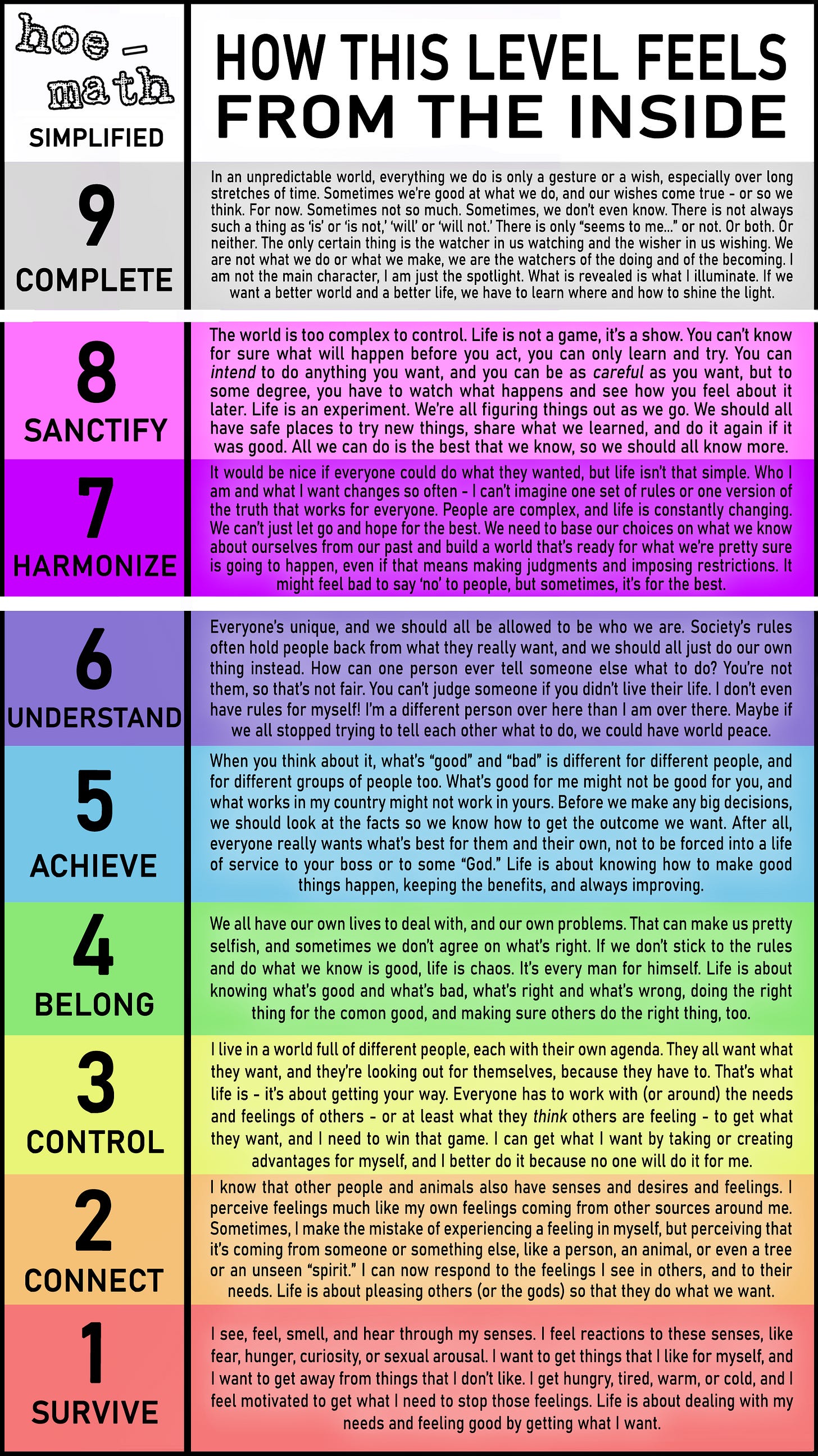




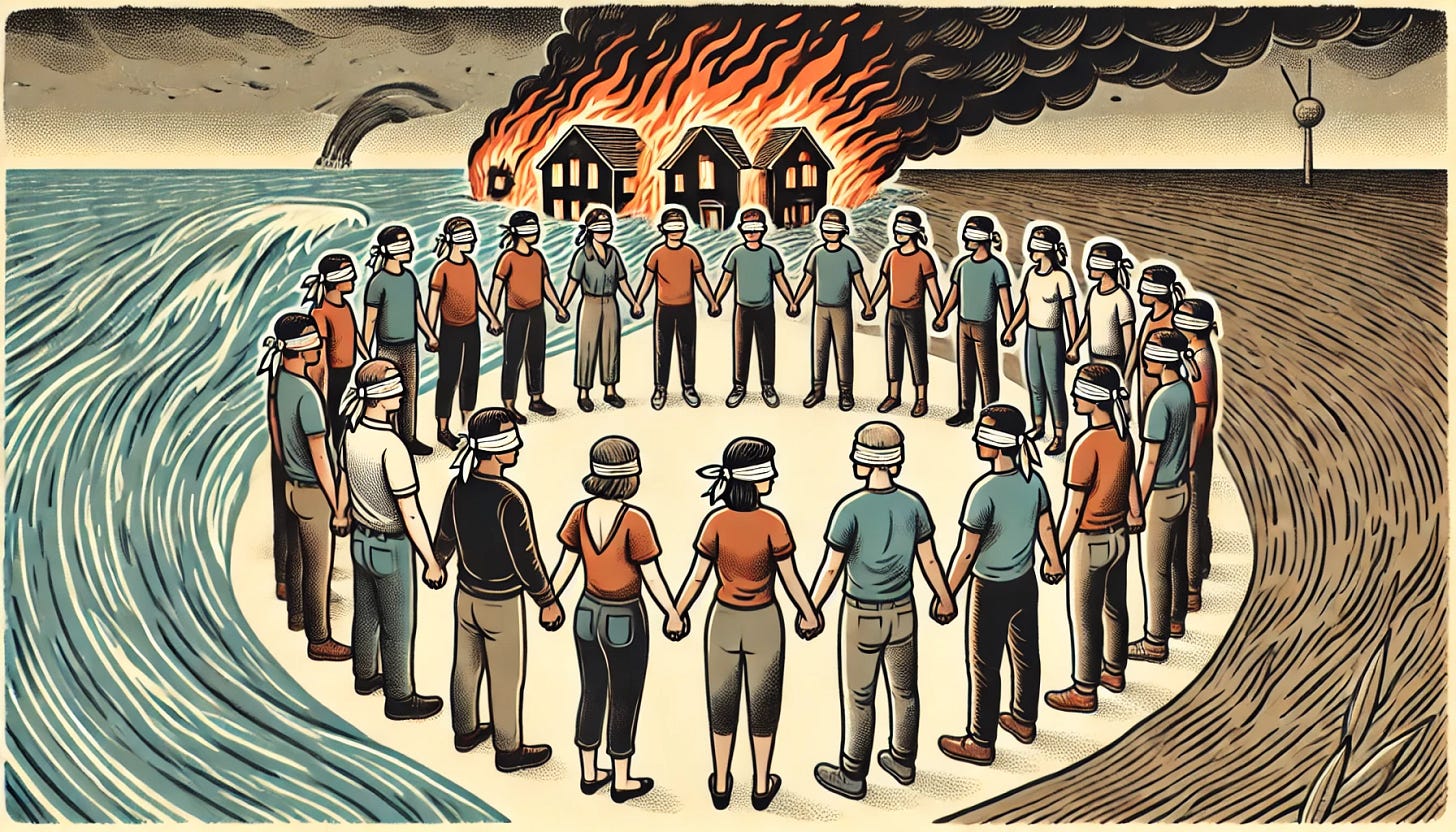

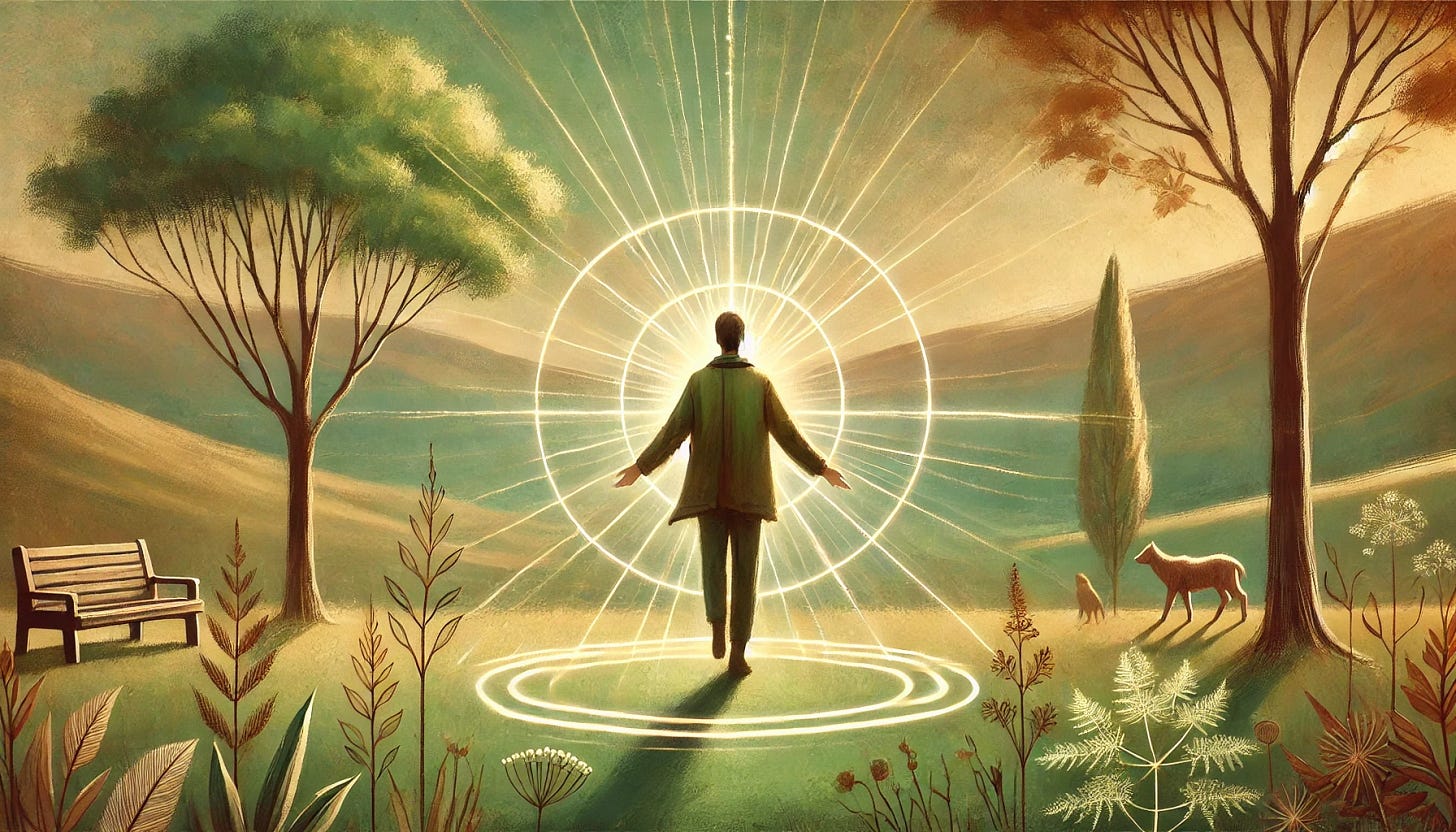
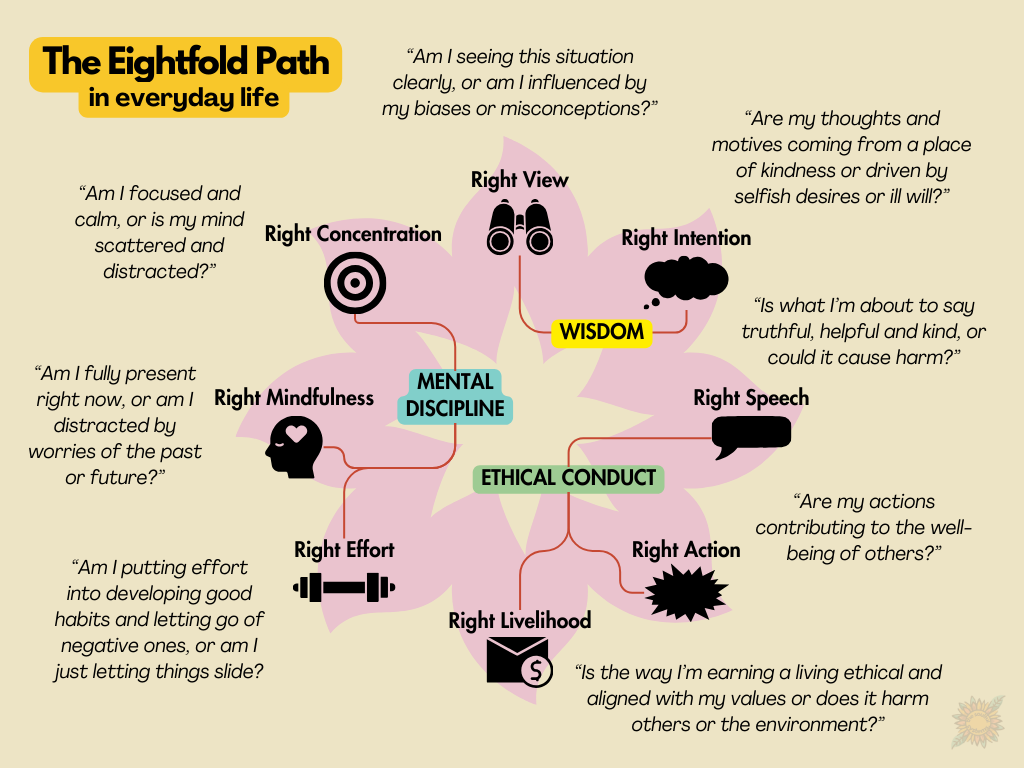
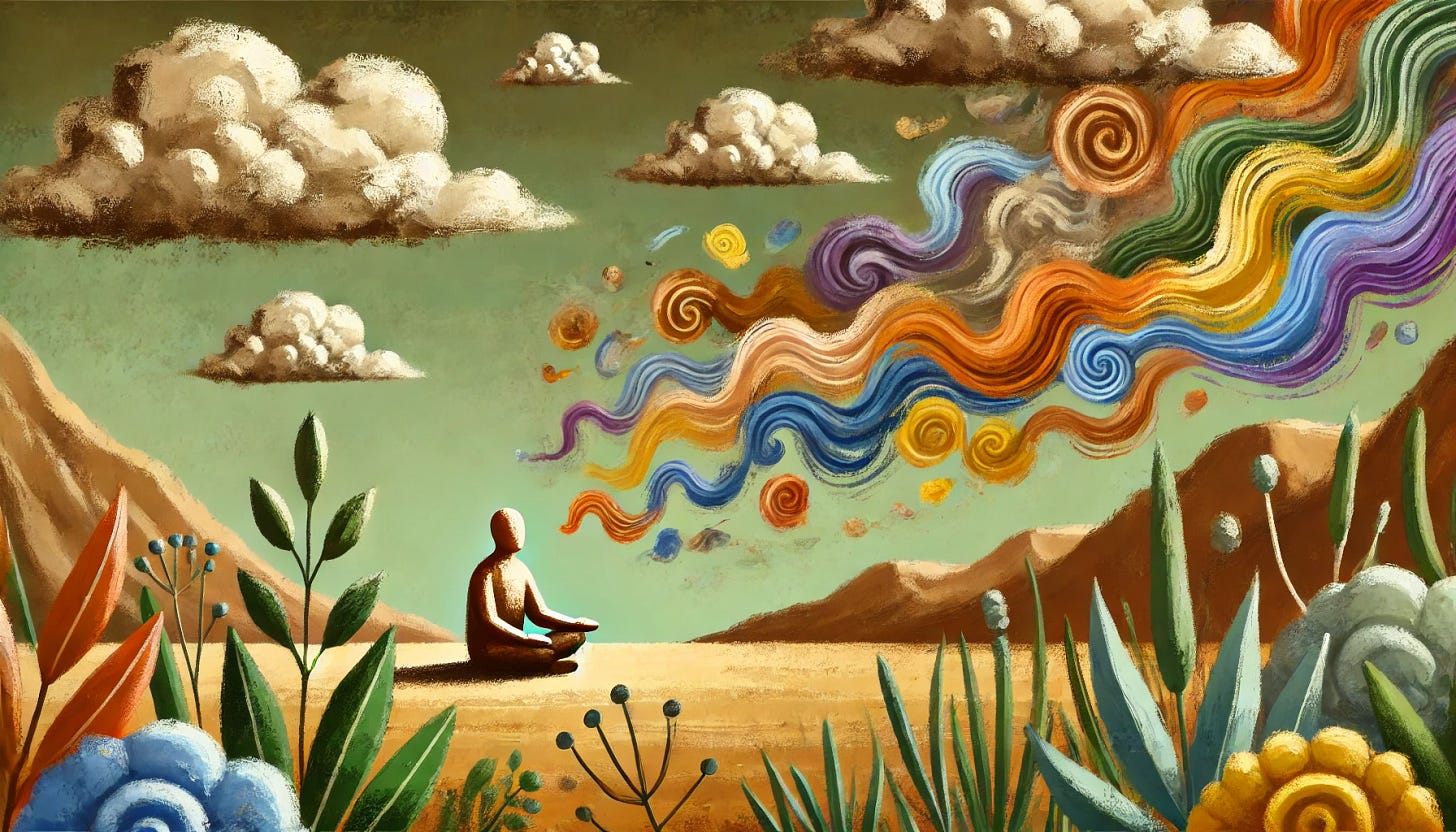

The two values are I value most in people are intellectual honesty and empathy.
I'm far from perfect myself, but I try. The Denial quiz was a bit painful, and (perhaps to protect my cognitive dissonance), I feel, not entirely fair.
Last year I was in the throes of a severe depression, from which I have yet to fully recover. I feel such a state influences the score of the denial quiz heavily:
1. Telling people the truth about that is not rewarded in my society, so sometimes I would lie, so I can't score 0 points on the first question. I wouldn't call that denial; I was excruciatingly painfully aware that everything was not good. I just couldn't be honest about it with everyone.
3. If you live -- let's just say perfectly -- then things going wrong are, in fact, beyond your control. There's some in-built assumptions behind the question, but I'm probably being too literal here.
6. Being severely depressed is like having a broken back and splitting migraine. Everything is too much to deal with, but it's not the person's fault.
7. Again -- and maybe I'm being pedantic here -- but if you're, for example, autistic, then you can absolutely brush off most of the feedback you get about how you behave, because it's typically from people who don't really understand what autism is. My daughter is autistic; she literally has a "handicap" regarding certain things, like reading social cues in group settings. Masking is painful and difficult, and getting (ignorant) "feedback" on one's antisocial behaviour is rather unfair. (To fix the question, add some clarifying adjectives to "feedback").
8. Yes, but suffering from severe depression there's nothing you can do about it. As I wrote in my post Part 2 of 5: Depression, "I desperately needed sleep, exercise, healthy food, and socialising. That much was clear. But every depressed person knows that. The problem is doing it. Neurons responsible for triggering healthy behaviours tend to hibernate during bad depressions. Eventually, just getting up off the floor gets difficult. Especially shower floors."
I think a lot of people deserve some slack for failign, as we all invariably do. The important things is that they're trying. (Humility stems from intellectual honesty).
Anyway, didn't really mean to nitpick your superb post, which I overall couldn't agree with more. Perhaps my critique of the quiz is just me exhibiting exactly what you're writing about: Denial. In that case, it just goes to prove a point, huh? :)
Oh, beautiful. Thank you for sharing this and for all the time you spent working on it. The denial scale/quiz will be very helpful in my life. I'm looking forward to reading more of what you've shared. :)